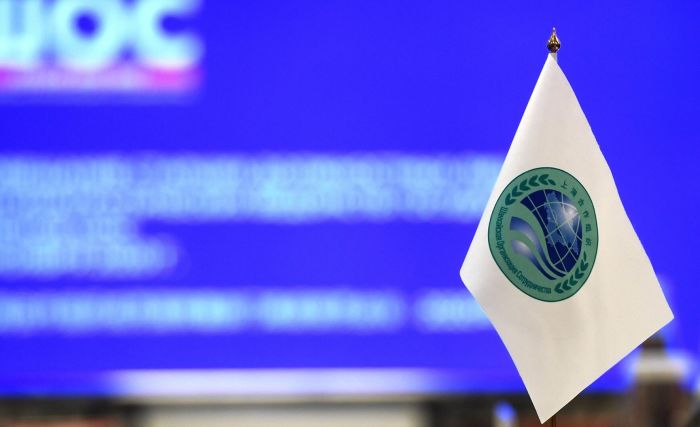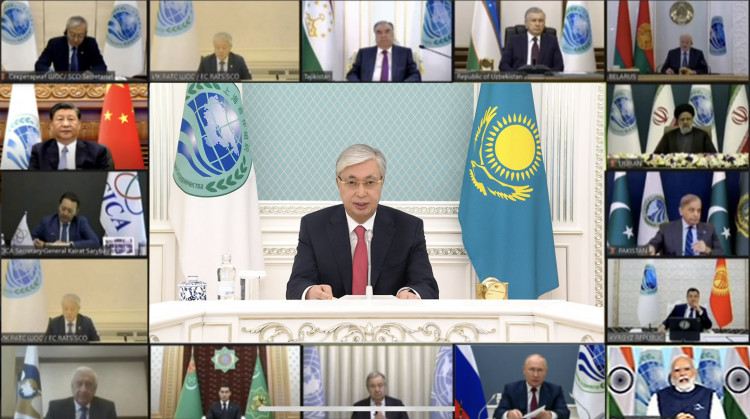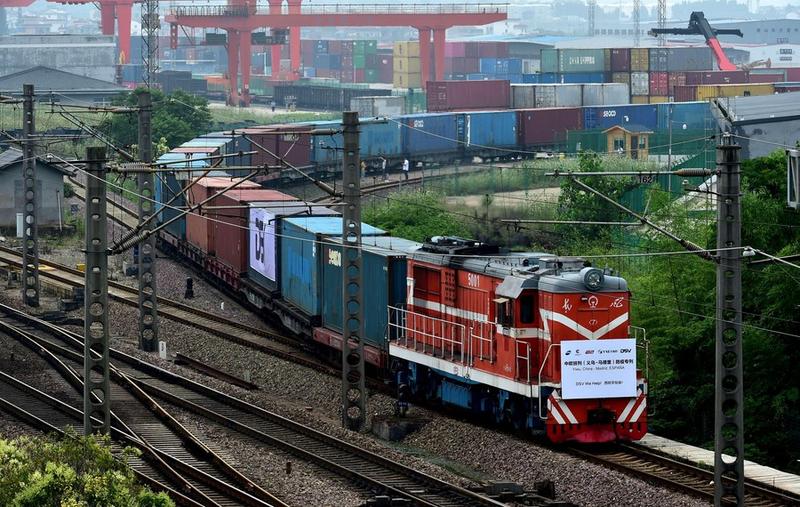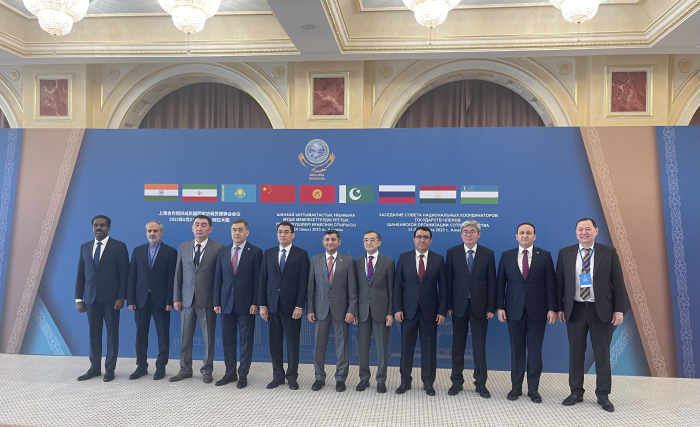ASTANA – Over the past 30 years of its independence, Kazakhstan has been at the forefront of regional diplomacy, fostering a constructive multivector foreign policy. This year, Kazakhstan has the opportunity to elevate the power of cooperative diplomacy within the Shanghai Cooperation Organization (SCO) to new heights following its assumption of the presidency during the organization’s virtual summit in July.

SCO logo. Photo credit: sectsco.org
In an increasingly interconnected world, yet marked by mounting confrontations, collaboration among nations is key to addressing complex regional challenges. However, it is hardly an easy feat and Kazakhstan is well aware of this. The country is set to play a pivotal role in transforming the organization and adapting to current realities.
What is the SCO?
Emerging from the shadows of history, the origins of the SCO can be traced back to the early 1990s, when China, Russia, Kazakhstan, the Kyrgyz Republic, and Tajikistan, driven by a shared vision of regional stability, initiated the Shanghai Five mechanism. This platform aims to resolve border disputes, promote mutual trust among its founding members, shift away from the Cold War mindset, and search for new forms of state-to-state relations and new models of regional cooperation. This was indeed a time when countries worldwide were collaboratively seeking new multilateral mechanisms.

President Tokayev addresses the SCO vurtual summit in July. Photo credit: Akorda
On June 15, 2001, the organization expanded its scope, and changed its name to SCO. A pivotal moment occurred in 2002 when member states signed the charter during a landmark meeting of the Council of Heads of States in St. Petersburg. This charter, which came into effect on Sept. 19, 2003, outlined the SCO’s objectives, principles, structure, and areas of operation, cementing its role as a significant force for regional collaboration.
The nine member states are China, India, Iran, Kazakhstan, the Kyrgyz Republic, Pakistan, the Russian Federation, Tajikistan and Uzbekistan. Additionally, the SCO has three observer states – Afghanistan, Belarus, and Mongolia – and 14 dialogue partners, including Azerbaijan, Bahrain, Qatar, Kuwait, the United Arab Emirates, Saudi Arabia and Turkiye.
The Samarkand SCO summit in 2022 initiated the process of elevating Belarus’s status within the organization to that of a member state. Presently, the SCO represents 40% of the world’s population, with member countries contributing to approximately a quarter of the world’s GDP, which amounts to over $23 trillion.

Laders of SCO member states, observer states, dialogue partners and invited guests in a historic city of Samarkand in September 2022. Photo credit: Akorda
The organization’s economic potential is enormous, said President Kassym-Jomart Tokayev at the virtual summit on July 4.
“With its significant political influence, substantial economic opportunities and vast human resources, the SCO is capable of making a significant contribution to achieving sustainable development goals (SDGs) and addressing the current challenges of humanity,” he said.
The importance of Kazakhstan’s presidency and its vision
As a founding member of the SCO, Kazakhstan has consistently demonstrated unwavering support for the organization since its establishment. Kazakh diplomats have put forward many initiatives, including the signing of the Agreement on Cooperation and Interaction of the SCO Member States on Border Issues, the adoption of the SCO Development Strategy until 2025, the SCO programs in the fight against terrorism, separatism and extremism, and food security programs, among other essential documents.
Now, Kazakhstan holds the authority to shape the organization’s agenda and help achieve its main objectives.
Addressing the SCO summit, President Tokayev outlined Kazakhstan’s priorities for its presidency, including a proposal to adopt a new development strategy. However, the primary focus remains to enhance regional security by combating what Tokayev describes as the three evils – extremism, terrorism and separatism – as well as protecting the sovereignty and territorial integrity of states, and non-interference in internal affairs.

The July 4 SCO summit was in a virtual format, with India passing the presidency at the SCO to Kazakhstan. Photo credit: Akorda.kz
He repeatedly underscored the importance of strengthening the so-called Shanghai spirit based on mutual trust and equal and open dialogue.
One of Kazakhstan’s initiatives in this area is a comprehensive document called On World Unity for Just Peace and Accord, which will incorporate ways to strengthen confidence-building measures and maintain stability and security.
Kazakhstan’s agenda also encompasses updating the Cooperation Program on Countering Terrorism, Separatism and Extremism for the years 2025-2027, adopting the SCO Anti-Drug Strategy for 2024-2029 and addressing the crisis in Afghanistan. This can be achieved through the proposed UN-led Regional SDGs Center for Central Asia and Afghanistan in Almaty.
Unlocking full economic potential is the second important priority. Over its three-decade existence, the SCO has yet to complete economic projects under its auspices. Yet, the SCO stands out from other organizations due to its unique advantages. These include the geographical connectivity of its member states, which provides opportunities for transit and transport. Additionally, the SCO benefits from a substantial market and member economies that complement each other.
While there is a willingness among politicians to work on collaborative projects, the main obstacle lies in the inability to secure funding and encourage direct and portfolio investment in regional projects within the SCO. Kazakhstan has suggested creating a joint Investment Fund using the opportunities the Astana International Financial Centre provides.
Promising areas for cooperation
Kazakhstan envisions significant potential in the transit and transport sector, energy security and digital transformation.
In the realm of transportation and transit, significant opportunities arise from the China-Europe rail transport network, the Trans-Caspian International Transport Route (TITR) and the Kazakhstan-Turkmenistan-Iran railway.

A China-Europe freight train with medical supplies en route to Madrid from the city of Yiwu. Photo credit: Lyu Bin/Xinhua
The China-Europe rail transportation network consists of freight rail lines that connect China with Europe, a major part of the Belt and Road Initiative. According to the China State Railway Group, the China-Europe freight train services saw a substantial 16 percent year-on-year increase, totaling 8,641 trips from January to June. Impressively, these freight trains transported 936,000 20-foot units (TEU), indicating a substantial 30 percent upsurge.
While still under development, TITR, a multimodal transport corridor linking China with Europe through Central Asia, has tremendous potential, particularly as countries in the region continue to seek alternative routes bypassing Russia.

in TITR, The Central Trans-Caspian Network, traversing through southern Kazakhstan, is the most sustainable option for forging the links between Central Asia and Europe, according to the latest EBRD study. Photo credit: middlecorridor.com
The Kazakhstan-Turkmenistan-Iran railway is expected to be completed in 2025. The railway will provide the shortest route from East Asia to the countries of the Persian Gulf. It will also help to boost trade and economic cooperation in the SCO.
Given its strategic geographical position bridging Europe and Asia, Kazakhstan assumes a distinctive role in driving regional collaboration. The nation’s status as a substantial energy producer further underscores its vested interest in safeguarding the stability of energy supplies within the region. Energy security is a prime objective for Kazakhstan during its SCO chairmanship. Kazakhstan called upon SCO member states to adopt an Energy Strategy incorporating SDGs. The upcoming SCO Energy Forum in Astana this autumn will focus on exploring energy security in greater detail.
Addressing the digital divide within the region is another way Kazakhstan intends to leverage its chairmanship.

Digital transformation is booming in Kazakhstan, where 95% of public services are provided in electronic format, including through an electronic government website. Screenshot of the e-Gov website.
Kazakhstan boasts a digital transformation that few developed economies can rival. Last year, Kazakhstan ranked 28th in the UN e-Government Development Index, the highest among the SCO member states.
Kazakhstan can share its IT solutions and their integration into the public administration system, the development of banking ecosystems, and growing fintech and e-commerce markets. The SCO Digital Forum, which Kazakhstan proposed to hold in Astana in 2024, will be a chance for SCO member countries to leverage the potential of digitalization across all sectors that are vital to the organization.
According to Kazakhstan’s national coordinator at the SCO, Murat Mukushev, nearly 80 events are planned during the country’s presidency at the SCO, culminating in the SCO Summit in July 2024 in Astana.
Kazakhstan’s amicable relations with fellow SCO member nations enable it to effectively facilitate dispute resolution and encourage cooperation to address shared challenges.
According to Tokayev, the SCO should “have its own vision for a fair and harmonious world and confidently pursue inclusive development and creative progress based on mutual responsibility and solidarity.”

On Aug. 21, the Council of National Coordinators (CNC) of the SCO member states started its work in Almaty as part of Kazakhstan’s chairmanship of the SCO. Photo credit: sectsco.org
“Assuming the chairmanship, we will continue active and fruitful work with all states, regardless of their status in the organization, for the benefit of further strengthening security, peace and prosperity in the SCO space,” said Tokayev.
On Aug. 21, the Council of National Coordinators of the SCO member states initiated its work, scheduled to continue until Aug. 24.
The agenda includes a wide range of issues related to the implementation of adopted decisions and preparation of new ones by the Councils of Heads of State, Heads of Government and Ministers of Foreign Affairs. Modernizing the organization, considering its expanded membership, and improving interaction with observer states, SCO dialogue partners, and international organizations is also on the agenda.

